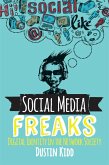Social media represents a social phenomenon that has arisen from employing the enormous capabilities provided by the communications revolution and in the heart, including the Internet, and if we look - for example - to one of the most famous of these means, which is the Facebook site, we will find that it has arisen in 2004 AD to represent a tool for communication on a scale Limited, especially students of some American universities, and then began to expand until the number of its users exceeded the billion users across all the Earth. This book discusses a set of issues related to privacy in the era of social media, as the reality decides that the community has the right to play its role in protecting the privacy of the users of these means and making them aware of the consequences of abandoning them. In this context, the book presents the risks of self -detection through social media and any users Excellent her? And to what extent can you see the content that others did not want to inform you of an important matter, if we admit that the motive for indulging in the contents of social media? And to what extent do individuals try to engage in online disputes by deliberately republishing the common contents, and why do they do that? And to what extent did any circumstances remove social media users to tolerate or overlook others? Are these trends different from one age to another, or through the different stages of life? Finally, what is the true benefit we achieve from participating in these means, and can we withdraw - simply - when we want to participate in these means? This is nothing but the tip of a flood of major questions that will help our way to understand the nature of interaction through social media. David R. Brick: Researcher, journalist, editor and academic who holds a doctorate in the media and communication from the London College of Economics. Break worked as an editor and correspondent of many prestigious press institutions such as the news site of the Libyan. with me. C., New Scientist magazine, as he worked as a lecturer in the field of media and journalism with a number of university institutions, including the colleges of Hambar in Canada, Bidfordshire, Leicester in the United Kingdom, and deals with Break research and articles the impact of social media on the individual and society, and the need for a new perspective to deal with it.
Dieser Download kann aus rechtlichen Gründen nur mit Rechnungsadresse in A, B, BG, CY, CZ, D, DK, EW, E, FIN, F, GR, H, IRL, I, LT, L, LR, M, NL, PL, P, R, S, SLO, SK ausgeliefert werden.









